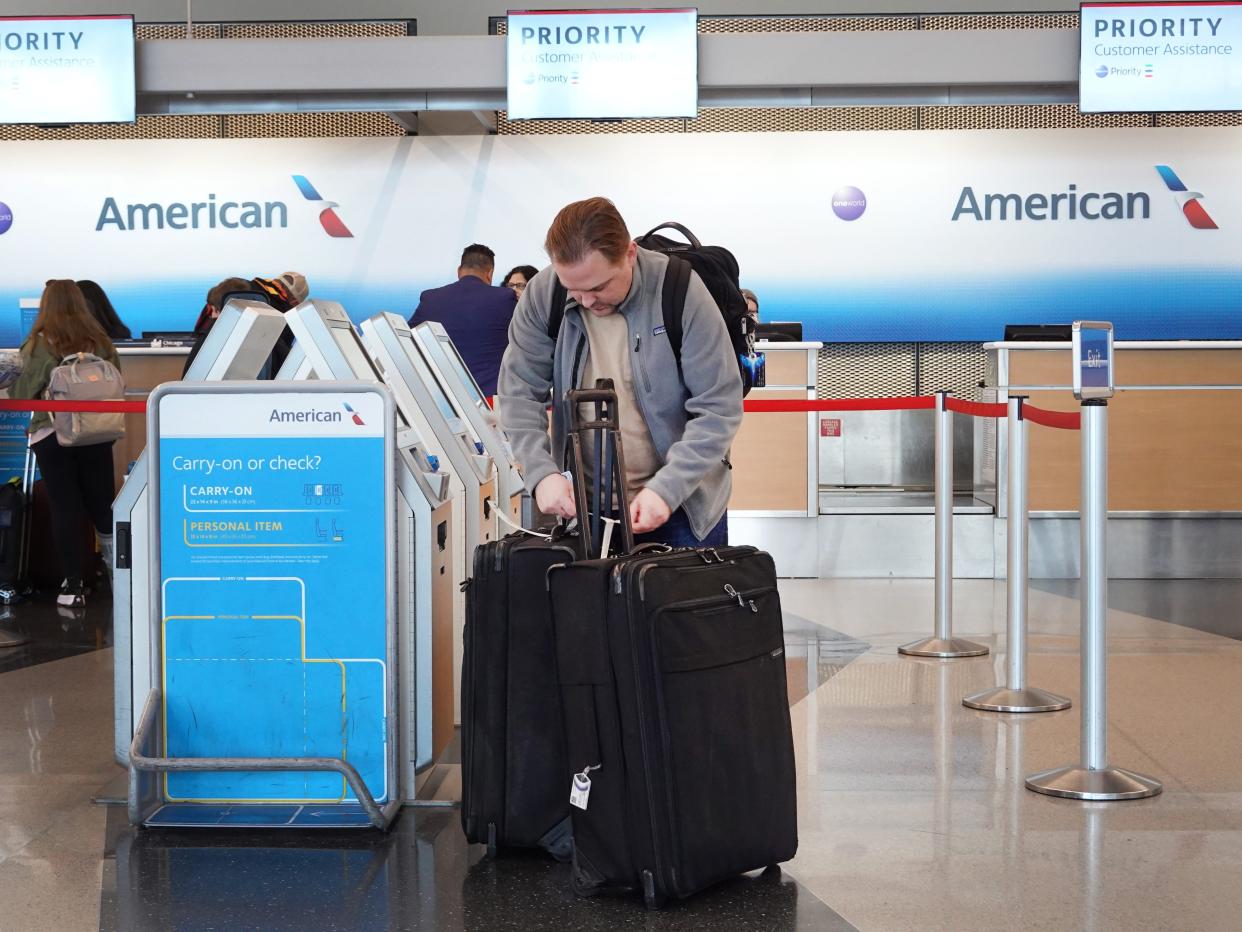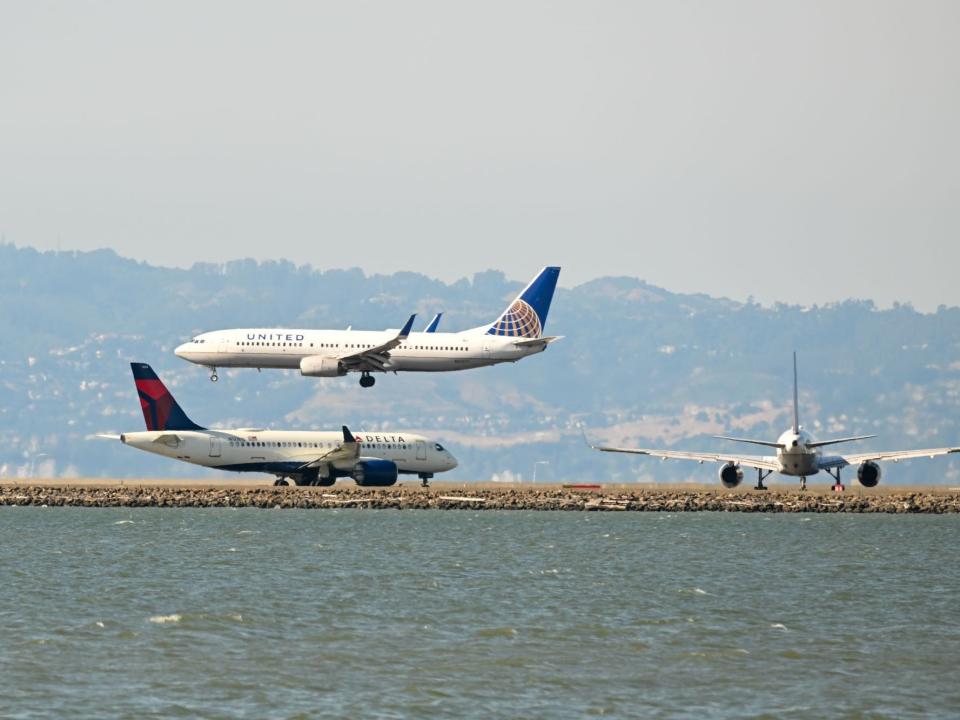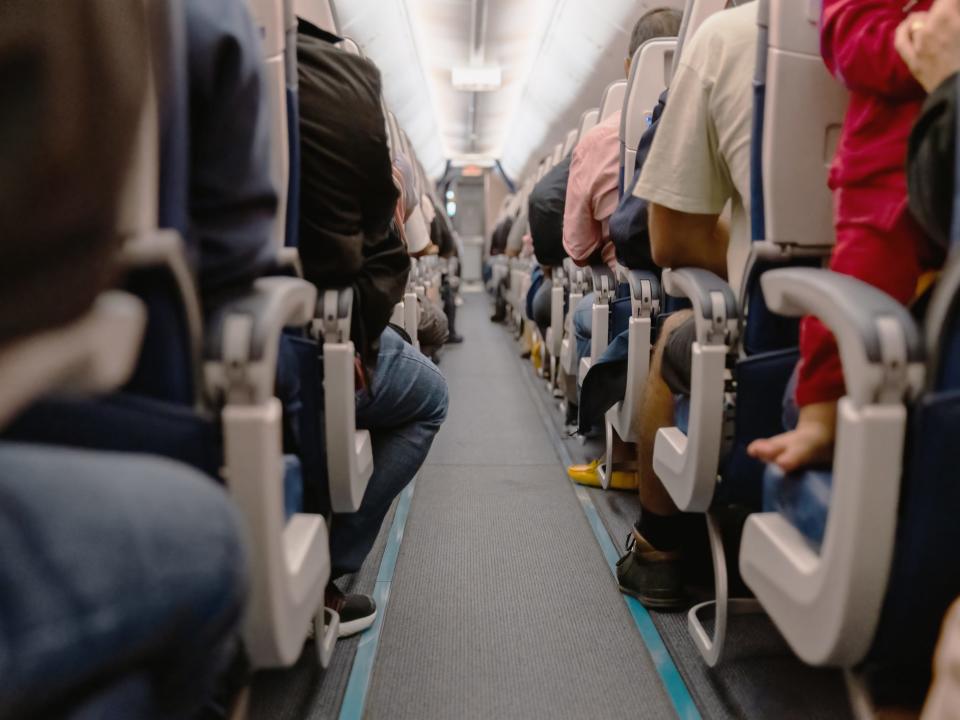What to do if an airline bumps you from an overbooked flight

Holiday travel broke records in July as severe weather forced disruptions at many airports.
Airlines oversell flights on normal days, and they're more likely to bump passengers during disruptions.
Here's what you should do if you're bumped from a flight and how to lower the odds of it happening.
The Transportation Security Administration screened a record number of passengers over the July 4th holiday weekend as airlines continue to see booming demand for travel. Sunday alone saw over 3 million people — the most ever in a single day.
According to the aircraft tracking website FlightAware, there were about 900 cancellations and about 20,000 delays between Thursday and Saturday for flights flying to, from, or within the US. Hurricane Beryl forced thousands more on Sunday and Monday as it made landfall in Texas.
Airlines overbook flights on a good day to ensure planes are full, but it's even more likely during times of weather and operational chaos. Depending on the traveler, getting bumped from a flight can either be an easy way to make some cash ($10,000 in one rare case) or a nightmare scenario that ruins your vacation.
Either way, there are a few things you should know if you're bumped from an oversold flight.
Voluntary and involuntary bumping
Denied boarding, or "bumping," happens when airlines overbook a flight. This means there are more passengers than available seats, and it's a perfectly legal strategy airlines use to optimize revenue.
According to the US Department of Transportation, when a plane is overbooked, airlines must first seek out passengers willing to volunteer to take a different flight in exchange for compensation.
This is considered a "voluntary" bump, where a passenger can essentially sell their seat back to the airline for anything from cash to a free ticket, per the DOT. There is no limit to the amount of money or vouchers that airlines can offer as compensation, and passengers can negotiate with the carriers.

If you accept the airline's compensation to give up your seat and take a later flight, the DOT recommends asking these questions to make sure you're aware of any restrictions:
When is the next flight on which the airline can confirm your seat? Will you be put on standby? The DOT warns that standby comes with risks because you could be left stranded if the later flights are also full.
Will the airline provide other amenities such as free meals, a hotel room, transfers between the hotel and the airport, and a phone card?
If you accept a free ticket or voucher, how long is it good for? Is the ticket or voucher unusable during holiday periods? Can it be used for international flights?
If not enough people volunteer, the airline will involuntarily bump customers. Most of the time, this occurs before the plane is boarded, and passengers cannot be removed from an aircraft after boarding unless for safety, security, or health reasons or if they're being disorderly.
According to the DOT, airlines must provide compensation for bumped passengers, as well as a written statement of their rights and how airlines select who and who doesn't get involuntarily bumped.
There are a few conditions and exceptions outlined by the DOT, including:
Aircraft change to a smaller plane due to operational or safety reasons
The aircraft holds fewer than 30 people
Weight and balance concerns for planes with 30-60 seats
The flight is departing from a foreign country and headed to the US
If none of these apply and you have a confirmed ticket, you met the check-in deadline, you were at the gate on time, and the airline could not get you to your final destination within an hour of your original arrival time, the DOT says you are entitled to denied boarding compensation, or DBC.
When you're entitled to compensation — and how much
According to the DOT, the DBC is based on the value of your ticket, the length of your delay due to the involuntarily denied boarding, and whether your flight was domestic or international. The agency said the airline might try to offer you a free flight or cash-equivalent voucher first, but you are entitled to cash or check if you prefer.

For domestic flights that arrive one to two hours later than scheduled, passengers receive 200% of their one-way fare, capped at $775. Arriving over two hours later entitles customers to 400%, capped at $1,550.
For international flights that arrive one to four hours later than scheduled, passengers receive 200% of their one-way fare, and anything over four hours is 400%. The same regulated minimum monetary caps apply, but the airline can decide at its discretion to offer more.
The DOT said compensation for non-fare tickets, like those paid for with points, is based on the lowest-priced ticket sold in the same class of the service on the same flight.
Passengers who booked a higher-fare class, like first or business, but were downgraded to a cheaper cabin must be refunded the difference in price, per the DOT. Customers can also receive a refund for extras they paid for but did not receive on their substitute flight, like a reserved seat.
How to lower the odds of getting bumped from a flight
There's nothing you can do to guarantee you won't get bumped from an overbooked flight, as one traveler who said he was bumped off an American Airlines flight learned the hard way.
However, you can take some steps to decrease your odds of getting bumped, such as buying higher-class seats, checking in on time, and having frequent-flyer status. The DOT said among those in the same fare class, the last to check in are the most likely to be involuntarily bumped.
Some travelers may consider booking on an airline that doesn't have a reputation for involuntary bumping.
According to the DOT's 2023 consumer air travel data, Allegiant Air, Delta Air Lines, and Hawaiian Airlines involuntarily bumped 0, 3, and 5 people, respectively, over the entire year. On the other end of the spectrum, American Airlines and Frontier Airlines involuntarily bumped over 10,000 passengers each in 2023.
"However, the criteria cannot subject a passenger to any unjust or unreasonable prejudice or disadvantage," the agency notes. "For example, an airline could not lawfully use a passenger's race or ethnicity as a criterion."
Read the original article on Business Insider

